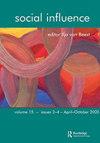关于心理学家政治偏见的信念重要吗?感知到的政治意识形态会缓和外行人对不法行为研究的理解
IF 0.6
3区 心理学
Q3 PSYCHOLOGY, SOCIAL
引用次数: 0
摘要
两项研究考察了一种可能的后果——即,如果外行人认为心理学家有自由主义倾向,就会对有关不法行为的心理学研究产生不必要的反应。研究1重复了先前的研究,表明当心理学家展示情境(与性格或互动因素相比)对不法行为的影响时,他们被认为给犯罪者分配了更少的责任。此外,在那些认为心理学家在政治上是自由派的参与者中,这种影响更强。研究2显示,当心理学家被明确认定为自由主义者时,参与者认为他们会全面淡化肇事者的责任,尤其是当责任归因是情境的时候。心理学家应该意识到,外行人对他们的政治倾向的看法可能会导致心理学家对人类行为的实际观点的不同解释。本文章由计算机程序翻译,如有差异,请以英文原文为准。
Do beliefs about psychologists’ political biases matter? Perceived political ideology moderates how laypeople construe research on wrongdoing
Abstract Two studies examine a possible consequence – namely, unwanted reactions to psychological research on wrongdoing – if laypeople perceive psychologists to have liberal tendencies. Study 1 replicated previous research by showing that when psychologists presented findings demonstrating situational (compared to dispositional or interactionist) influences on wrongdoing, they were perceived as assigning less responsibility to perpetrators. Further, this effect was stronger among participants who perceived psychologists to be politically liberal. Study 2 revealed that when psychologists were explicitly identified as liberals, participants believed they would downplay perpetrator responsibility across the board, but particularly when the responsibility attributional account was situational. Psychologists should be aware that laypeople’s perception of their political leanings could lead to discrepant construal of psychologists’ actual perspectives on human behavior.
求助全文
通过发布文献求助,成功后即可免费获取论文全文。
去求助
来源期刊

Social Influence
PSYCHOLOGY, SOCIAL-
CiteScore
1.50
自引率
0.00%
发文量
4
期刊介绍:
Social Influence is a journal that provides an integrated focus for research into this important, dynamic, and multi-disciplinary field. Topics covered include: conformity, norms, social influence tactics such as norm of reciprocity, authority, scarcity, interpersonal influence, persuasion, power, advertising, mass media effects, political persuasion, propaganda, comparative influence, compliance, minority influence, influence in groups, cultic influence, social movements, social contagions, rumors, resistance to influence, influence across cultures, and the history of influence research.
 求助内容:
求助内容: 应助结果提醒方式:
应助结果提醒方式:


